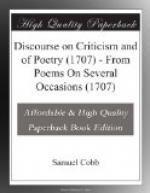For to display our Candour and our Sence,
Is to discover some deep Excellence.
The Critick’s faulty, while the
Poet’s free;
They raise the Mole hill, who want
Eyes to see.
Excrescences are easily perceiv’d by an ordinary Eye; but it requires the Penetration of a Lynceus to discern the Depth of a good Poem; the secret Artfulness and Contrivance of it being conceal’d from a Vulgar Apprehension.
I remember somewhere an Observation of St. Evremont (an Author whom you us’d to praise, and whom therefore I admire) that some Persons, who would be Poets, which they cannot be, become Criticks which they can be. The censorious Grin, and the loud Laugh, are common and easy things, according to Juvenal; and according to Scripture, the Marks of a Fool. These Men are certainly in a deplorable Condition, who cannot be witty, but at another’s Expence, and who take an unnatural kind of Pleasure in being uneasy at their Own.
Rules they can write, but, like the College Tribe, Take not that Physick which their Rules prescribe. I scorn to praise a plodding, formal Fool, Insipidly correct, and dull by Rule: Homer, with all his Nodding, I would chuse, Before the more exact Sicilian Muse. Who’d not be Dryden; tho’ his Faults are great, Sooner than our Laborious Laureat? Not but a decent Neatness, I confess, In Writing is requir’d, as well as Dress. Yet still in both the unaffected Air Will always please the Witty and the Fair.
I would not here be thought to be a Patron of slovenly Negligence; for there is nothing which breeds a greater Aversion in Men of a Delicate Taste. Yet you know, Sir, that, after all our Care and Caution, the Weakness of our Nature will eternally mix it self in every thing we write; and an over curious Study of being correct, enervates the Vigour of the Mind, slackens the Spirits, and cramps the Genius of a Free Writer. He who creeps by the Shore, may shelter himself from a Storm, but likely to make very few Discoveries: And the cautious Writer, who is timorous of disobliging the captious Reader, may produce you true Grammar, and unexceptionable Prosodia, but most stupid Poetry.




